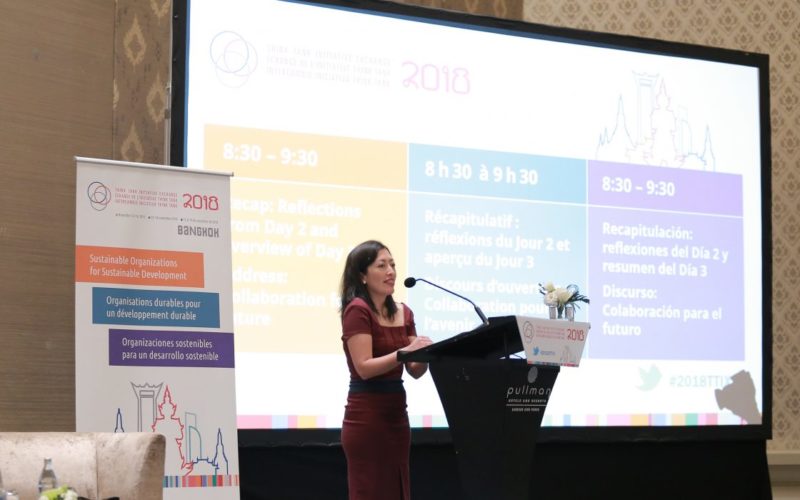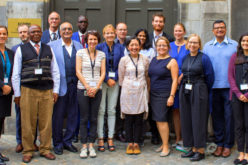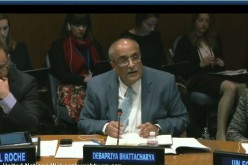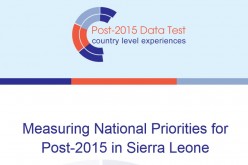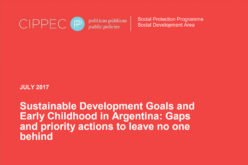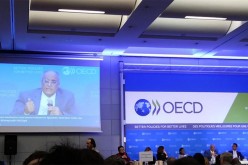Down memory lane: the evolution of our community
My task is to reflect on the future of collaborations among think tanks of the Global South. But I want to briefly remember how things were when we met for the first time Capetown, 2012.
As part of the preparation for that Exchange in 2012, I was tasked – along with other researchers in the think tank where I worked, Grupo FARO – to explore the policy influence of the TTI grantees. We looked into twelve stories of policy influence. When I remember doing this in 2012, it felt a lot like astronomy: sitting back in Quito, my hometown, looking at some think tanks very far away – Senegal, Nepal, Bangladesh – and seeing what they were doing for the very first time.
I will not recapitulate what we found but reflect on some things that we missed, or overlooked.
The first one is about collaborations. We did identify that think tanks were critical catalysts in their context, joining different actors together to discuss issues around elections or critical social changes that needed to happen. But what should have caught our attention at the time was that these collaborations did not explicitly mention partnerships between think tanks. Why? One option is that the think tank scene in our countries was just emerging. For possible cross-country collaborations, we were yet to meet. A pessimist could argue our business is too competitive: we race for funding and also for the time and the interest of our audiences. I tend to be the optimist so, I will stick to one of the first hypothesis.
The second thing that we overlooked when we analysed these stories is that all of them were at the national level. We did not come across a story that talked about the think tanks’ role at the regional or at the global level. It is clear that in 2012 the main focus of this community was national politics. Practically this makes sense. Think tanks need to position themselves in their policy arena. It also makes sense with the program: TTI was born with the premise that local research will solve local problems.
But the fact that we overlooked this characteristic of southern think tanks reflects a widely held belief about research that comes from the North and the South. We tend to see research that comes from the North as universal, while ideas that are coming from the South tend to be portrayed as only contextual or particular. So ingrained is this belief about our work that just a few years ago, we, the authors of that analysis, did not question why is it that the work of our think tanks should be limited to the borders of our countries. But this is something that is changing. Finding the right way to navigate the balance between having universal and particular ideas will be a critical ingredient for the future collaboration of this community across countries and continents.
Constellations: the future of think tanks in the global South
Now let us move to the future. Reflecting on the job in front of us, again, I think it will be like astronomy, but not like in the past when we were identifying individual think tanks. Now it is about building and identifying constellations. Constellations are a powerful metaphor because, throughout the centuries, constellations have served a purpose. They have guided agriculture: farmers have used constellations to know when to sow or when to harvest. They have guided navigators to find their way around the globe. They have always been there with a purpose. They have also served different interpretations; different cultures have seen constellations and identify different patterns and various reasons for having them.
And so, when I think about the future of this community, I see a variety of constellations, different configurations that will have various purposes and will last different lengths of time. I think some of them will be more formal and some will be more informal. But the most important thing for all the constellations we build will be to find their purpose: a change, a reform that cannot be achieved by one think tank alone. This is the most critical thing that we need to think about when building new collaborations.
Let me share a bit about Southern Voice’s quest for a purpose. We are a network of over fifty think tanks informing the 2030 agenda and the SDGs. How did Southern Voice find its purpose? Southern Voice was born in 2012 in Capetown, thanks to the vision of Deb Bhattacharya and other researchers who got together on a space that was called ‘hot topic’ to discuss the role of Southern Think Tanks in informing the ‘post MDG’ debates. From 2013 to 2015, we participated in the debates on the new Development Goals. We mixed concrete actions to inform global debates with opportunities to meet and reflect on what was the final objective of the network. Of course, we do research, outreach and communications. But through this process, we identified that Southern Voice’s ultimate goal is to contribute to the power realignment between governments in the international debates of the SDGs and international development. This story highlights the iterative process of finding purpose.
Now I want to go into the ingredients for having successful collaborations. I will focus on two levels: one of them is what is the type of think tank that becomes a collaborator and then what kinds of networks tend to work.
The think tank that collaborates
So the first question is: how do think tanks that collaborate look like? I have no scientific answer but reflections from my experience trying to build collaborations among think tanks.
First, organisations that are good at collaborating tend to be horizontal. They tend to decentralise decision making and allow a diverse group of the staff to engage and participate in meetings and networks. Executive directors have a difficult mandate to take care of their organisations. So they should encourage other colleges to look into collaborations, since they have the bandwidth not to think only about their own organisation but about network collaborations and what that entails.
Second, if you are looking for a partner, I would keep an eye on how adaptive a think tank is. When you are thinking about collaborating you will need to be flexible. Different organisations have different ways of doing things, from how you organise your research to how you plan a conference or what is your travel policy; all these nitty-gritty details will emerge at the time of collaborating. Most importantly, you have to look for a partner that will be adaptive in sharing the credit and acknowledgement of the work, because once you are working together that becomes more blurry, you will have to learn how to navigate that.
And third, if I were looking for a collaborator, I would look for a think tank that is mindful of cultural differences. It sounds like a very soft skill, but it becomes critical when you are working across regions and continents. I would look for think-tankers that are not scared to be lost in translation, and that will make an effort to manage these differences.
Building constellations with purpose
The second set of reflections that I want to make is about what the networks that have a purpose and that can collaborate look like. And I do not wish to focus on the topics; I will focus more broadly on what these networks look like. For that I want to recall Immanuel Wallerstein, who has written this great book about the work of intellectuals, and I think his definition of being an intellectual fits with the work that we do. He says:
- first, one has to be an analytical person in the search for truth;
- second, one must be a moral person in search of the beautiful and the good;
- third, we must be political, seeking to unify the truth, with the beautiful and the good.
So: analytical, moral and political in search of the truth, the beautiful, the good and how to put all these things together. Most importantly, Wallerstein says, we should not be tempted to divide these roles. We tend to think “oh, we are analytical, so we cannot be political” or we cannot take into consideration what is good and what is beautiful.
If we accept his proposal as a description of the work of think tanks, then how do we do it together?
What do we need to search for the truth together? I think here it is essential to be able to work holistically and to accept interdisciplinary approach and diversity of tools that we could use for our research. When we are working together, we cannot do all the work ourselves. We need to understand each other’s methods and to be able to manage and navigate the conflicts that arise from diversity.
The second role is to find the good and the beautiful. How do we do that together? The essential ingredient is trust. When we are talking about the good and the beautiful, we are beyond being analytical; we will be in that space between the known and the unknown. That is precisely when trust becomes essential because it will help us to navigate uncertainty. If we trust each other, we will give each other the benefit of the doubt, that whatever each of us is doing within the collaboration is for the ultimate goal that we strive for. To create this trust we need to increase the transparency and the honesty of our organizations. We need to know which are our strengths, which are our weaknesses and being as transparent as possible with each other about these.
And the third one is that if we want to join in political action – and this one might be the most controversial of all- we will need shared objectives which will require negotiations and understanding each other’s priorities and contexts. In a more practical level, we need to connect beyond just research. When we are talking about collaborations, we cannot think that it is only about joining researchers. It has to be about joining our communication teams, our fundraising teams, our institutional development teams.
If we want to reach the point of where we are able to collaborate in political action, we will need leadership. We will have to take risks, get out there, calling everybody in and mobilise the strength of this network. When we are thinking about the leadership of networks, it is sometimes opposite to the conventional wisdom that you have to think about your own organisation. When you are thinking about a network, you have to go beyond the interest of your organization and to start thinking about the higher purpose that we have been discussing.
Sounds hard. Then why do it?
It is not easy to build a community. It will take a lot of patience, resources, leadership and dedication. So, why should you even do it? That is where I want to end the keynote of today.
If it is so hard, if it will take an investment from everybody’s side, why is it that we have to do it? And for that I want to go back to what I was saying on the importance of changing this paradigm that the northern thinking is universal and that the southern thinking is only contextual or particular.
I think that the moment is ripe for that change. There is the crisis of understanding expertise and the legitimacy of who an expert is. There is an overload of information and, in that sense, there is an interest and a need for this new fresh thinking to be emerging from the Global South. It is not only case by case findings from what we are doing. Through collaborations, this can become new thinking of how we define development.
This is my call for you: this is the time, the moment is ripe for a change to happen. In 2012, we were not ready, and I think I have made that point emphatically. I think we are more prepared at this time to take on this challenge.
This is the end of an era for this community, but I am sure that this is not the last time that we will see each other. We should all strive to do that, to meet again under different constellations and different settings.
After a poignant keynote address to set the tone for the day, Andrea shared her insights on what she believed the role of southern think tanks will be over the next decade.


